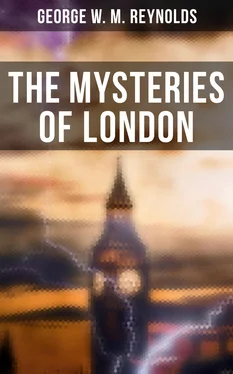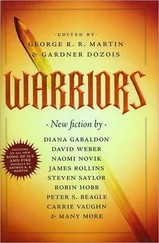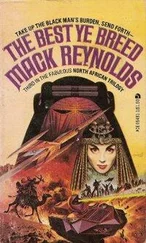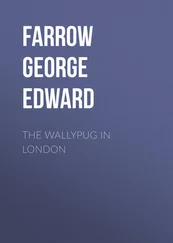Richard followed, with absorbing interest, the able defence made for him by his counsel; and his soul was filled with hope as each fact and argument in his favour was divested of all mystery, and lucidly exhibited to the consideration of the court.
Mr. Monroe was summoned to the witness box, and he proved the statements made by the prisoner's counsel relative to the pecuniary position of his ward. Snoggles, the ostler, followed, and very freely stated all the particulars of his late master's precipitate decampment from Baden.
Thus terminated the case for the defence.
The counsel of the prosecution—according to that odious right which gives the accusing party the last word in those instances where the defendant has called witnesses—rose to reply. He stated that neither the wealth nor the social position of an individual afforded a certain guarantee against crime. Besides, the law must not always be swayed by the apparent absence of motives; because some of the most extraordinary deeds of turpitude upon record had never been traced to a source which could satisfactorily account for their origin. The perpetration was the object which the jury had to keep in view; and the use of evidence was to prove or deny that perpetration by some particular individual. A forgery had been committed, and money obtained by the prisoner at the bar through the agency of that forgery. The defence had not attempted to deny that the prisoner was the individual who had thus obtained the money. The point to be considered was, whether the prisoner knew the note to be a forged one; and he (the learned counsel) considered that an assemblage of circumstances of a most unequivocal nature stamped the prisoner with that guilt. Mr. Chichester's evidence went to show that he himself never gave any notes to the prisoner. Even if Chichester were proved to be a disreputable person, there was nothing beyond the prisoner's mere assertion (made through his counsel) to prove that he had received the two notes from Chichester. Mr. Chichester had certainly assumed another name during his German tour, but it was for the purpose of avoiding arrest in a foreign land upon bills of exchange which might have been sent from England after him. He had, moreover, assumed the distinction of Honourable —a foolish vanity, but by no means a crime; for half the Englishmen who were called Captain , were no more captains than he (the learned counsel) was.
The senior judge now summoned up the evidence to the jury; and the most profound interest was still manifested by all present in the proceedings. The learned judge occupied nearly two hours in his charge to the jury, whom he put in possession of all the points of the case which it was necessary to consider.
The jury retired, and debated for a considerable time upon their verdict.
This was the dread interval of suspense. Richard's countenance was deadly pale; and his lips were firmly compressed in order to prevent any sudden ebullition of feeling—a weakness to which he seemed for a moment inclined to yield. Mr. Monroe did not entertain much hope; the summing up of the judge had been unfavourable to Markham. As for Whittingham, he shook his head dolefully from time to time, and murmured, loud enough to be heard by those near him, "Oh! Master Richard, Master Richard! who would ever have propulgated an opinion that you would have been brought into such a fixture as this? It's all along of them fellers which call butlers tulips !"
How singularly reckless is the mind of man with regard to the destinies of those to whom he is not connected by any ties of blood or friendship! While the jury were absent, discussing their verdict, the various barristers, assembled round the table, began chattering together, and laughing, and telling pleasant anecdotes, as if the fate of a fellow-creature was by no means compromised at that moment. The counsel for the prosecution, who had done his duty by exerting all his talents, all his energies, and all his eloquence, to obtain the conviction of a youth who had never injured him, and whom he had never seen before, coolly took up a newspaper and perused it with evident gratification; while, at a little distance from him, stood the individual whom he had so zealously and earnestly sought to render miserable for life!
How strange!—how horribly depraved and vitiated must be that state of society in which hundreds of talented men are constantly employed, with large recompense, in procuring the condemnation of their fellow-creatures to the scaffold, the hulks, or eternal banishment! And what an idea must we entertain of our vaunted condition of consummate civilization, when we behold these learned men calling to their aid every miserable chicanery, every artificial technicality, and every possible exaggeration, to pursue the accused prisoner either to the platform of the gibbet, to loathsome dungeons, or to the horrors of Norfolk Island. Does society avenge?—or does it merely make examples of the wicked to warn others from sin? If the enquirer who asks himself or us these questions, would only attend the Central Criminal Court, he would hear the barristers for the prosecution imploring, coaxing, and commanding the jury to return such a verdict as will either condemn a human being to the scaffold, or separate him for ever from home, wife, children, kindred, and friends! He would find men straining every nerve, availing themselves of every miserable legal quirk and quibble, torturing their imaginations to find arguments, calling subtlety and mystification to their aid, shamefully exaggerating trivial incidents into important facts, dealing in misrepresentation and false deduction, substituting and dovetailing facts to suit their purposes, omitting others which tell against their own case, almost falling upon their knees to the jury, and staking their very reputation on the results—and all these dishonourable, disgraceful, vile, and inhuman means and efforts exerted and called into action for the sake of sending a fellow-creature to the scaffold, or separating him for ever from the family that is dependant upon him, and that will starve without him!
O God! is it possible that man can have been made for such sad purposes? is it possible that the being whom thou hast created after thine own image , should be so demon-like in heart?
Oh! if the prisoner standing in the dock had inflicted some terrible injury upon the honour or the family of the barrister who holds a brief against him, then were it easy to comprehend that profound anxiety on the part of this barrister, to send the trembling criminal to the gallows! But, no—that barrister has no revenge to gratify—no hatred to assuage—no malignity to appease; he toils to take away that man's life, with all his strength, with all his talent, and with all his energy, because he has received gold to do his best to obtain a conviction!
Ah! what a hideous traffic in flesh and blood!
And if any one were to say to that barrister, "Thou art a blood-thirsty and merciless wretch," he would answer coolly and confidently, "No: on the other hand, I subscribe to philanthropic institutions!"
The jury returned; and the feeling uppermost in their minds was satisfaction at the prospect of being so speedily dismissed, to their respective homes, where they would pursue their efforts after wealth, and speedily forget the youth whom they had condemned to punishment, and whose prospects they had blasted.
For their verdict was Guilty !
And the judges hastened to terminate the proceedings.
Richard was commanded to rise, and receive the sentence of the court. He obeyed with a kind of mechanical precision—for his mental energies were entirely prostrated. The voice of the judge addressing him rang like the chimes of distant bells in his ears;—the numerous persons whom he beheld around, appeared to be all moving and agitating like an immense crowd assembled to witness an execution.
Читать дальше












